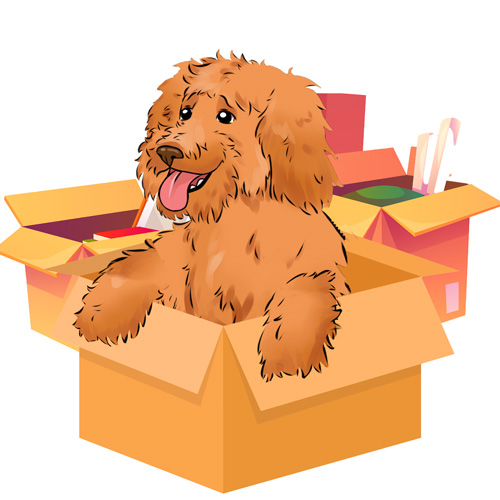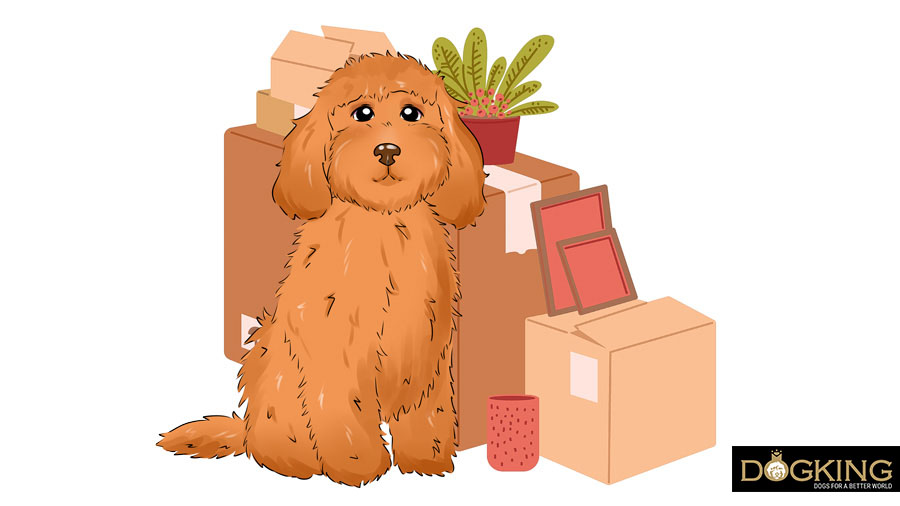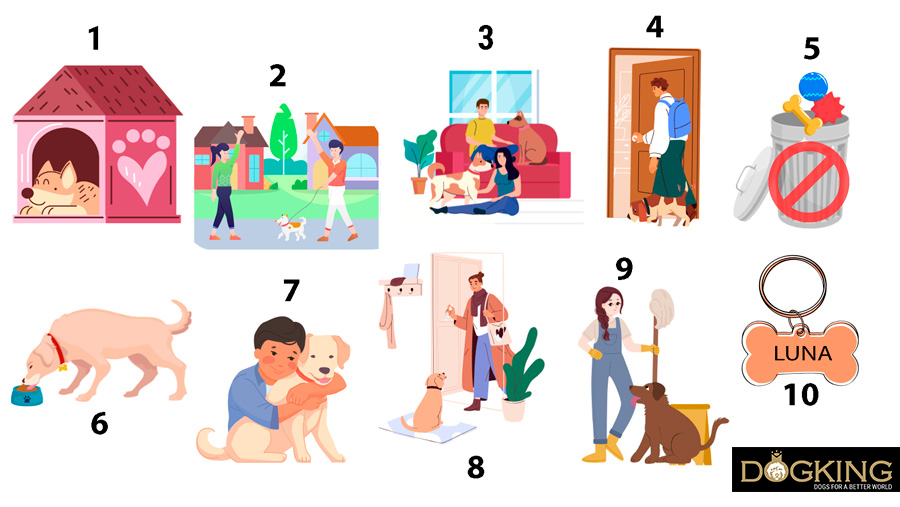Moving house with dogs
How to reduce stress in this situation of change

TIPS TO HELP THEM GET THROUGH IT AS WELL AS POSSIBLE
Approximate reading time: 7 minutes
If you consider moving house a very stressful situation, imagine how stressful it can be for your dog. From one day to the next, they will find themself in a new and unfamiliar home where smells, noises and objects will be different. Not to mention the shifting of crates and boxes back and forth, which can cause your pet high levels of anxiety. Here are some tips to reduce your dog's stress if you're moving house - take note! Your furry friend will thank you for it.
Dogs are territorial animals and very sensitive to change. Although each dog has a different character, we can assure you that in all cases, a change of residence will be an upheaval for them. Remember that while you and your family have some time to adapt from the moment you make the decision to move, for your dog everything happens very suddenly. All the smells they are used to, the layout of the house, the furniture, the neighbourhood... all of a sudden, everything changes and they have to get used to new stimuli coming at them from all directions. As their best friend and protector, you will have to be very attentive to the signals and make them as comfortable as possible during these days of change.

Índice del contenido
1- Avoid stressing out your dog during a move
Avoid stressing out your dog during a move

- 1. Provide a safe place for your dog. While you're packing up all the things that need to be moved, cleaning or organising boxes, the house will become a real mess. Your dog may be curious about these changes and it's a good idea to let them wander through the clutter to satisfy their exploratory nature and manage the situation normally. However, it is important that your pet is able to retreat to a safe place if they become too overwhelmed. Design or adapt this place with care, equipping it with their favourite toys, bedding and anything else you think will provide a distraction or make them feel safe.
- 2. Visit the new neighbourhood. Whenever possible, you can go for a walk in the new neighbourhood. This way, your dog will pick up new smells and be able to greet neighbourhood dogs. They will mark trees with their urine and become familiar with the sounds of the area.
- 3. Visit the new house. You can also visit the new house so that your pet can recognise the space, sniff around corners and, in short, normalise the place so that it won't seem so threatening when you move in. Accompany them to each of the rooms and show them, as long as the dog behaves in a calm and serene manner. Also show them their space, if possible, with their things in place. If you see that they are too restless, wait until they calm down before continuing with the visit. You can make as many visits as they need and, during these moments, give them your undivided attention with cuddles, games and even treats.
- 4. Last to arrive. On moving day, make sure your dog is the last to arrive. It is best that when they come through the door, everything is already in its place, including their things, and the atmosphere is calm and peaceful. Otherwise, your dog could become very stressed with so many boxes, noises and nervousness around them
- 5. Don't throw his things away. You may have had to do some cleaning when you moved house, but in the case of your dog's things, it's not a good idea to get rid of them during the move. In the new house, absolutely everything will be new for your pet, so their blanket, their toys or their bed will be the only familiar scent that they will cling to in this situation of profound change. We also advise you not to wash your dog's textiles or cloth toys for the first few days, so that they retain their old smell as much as possible.
- 6. This is not the time for any more changes. Even if moving to a new house means changing your habits, try not to affect your dog's routine. Moving house and moving house have been hard enough for them without having to change the time they go for a walk or eat their meals. In short, try to keep everything to do with your dog exactly the same as usual.
- 7. Be there for your dog. Difficult times require us to be there for our friends, and your pet is no exception. In the days following the move, we recommend that you keep an especially close eye on your dog. Play with them a lot, give them lots of affection, encourage them to eat their favourite snack and, in short, help them to stay entertained and maintain normality.
- 8. Rules, for later. The new home may bring with it new rules. Perhaps it's a rented house where you have to avoid damage, you've bought new furniture that you want to protect from any incidents, or there's a particular room you don't want the dog to go into. Whatever it is, the new rules can wait a few days, at least until your dog is more relaxed and acclimatised to their new home.
- 9. Stay calm. Although it may be difficult to remain calm in a stressful situation like moving house, keeping your cool will help your dog a lot. The way you talk, move and relate to your surroundings will be a mirror for your pet. Remember that you are their role model.
- 10. Be cautious. In the first few days be very careful about leaving doors open, as in a stressful situation, your dog may try to escape back to their old home. Don't forget to update the address details on his ID tag, if they has one, and on their chip.
Moving house is just as stressful for your dog as it is for people. The only difference is that they will not know what is happening at any given moment. Therefore, our advice is to keep a close eye on their behaviour during these days, and if you detect anything worrying, such as them stopping eating, destructive behaviour or barking non-stop, contact your vet. As in any other important moment in your dog's life, the important thing is that you are by their side as an inexhaustible source of love and security. Your dog will soon be enjoying their new home and neighbourhood to the full.
Also, bear in mind that proper socialisation of your dog from puppyhood onwards will help them cope much better with changes in general. In this sense, our Australian Cobberdogs are a very adaptable breed to new situations. With proper socialisation from puppyhood, they develop a great ability to adapt to new environments. Due to this flexibility of character and their sociability, they are ideal for assisted therapy.